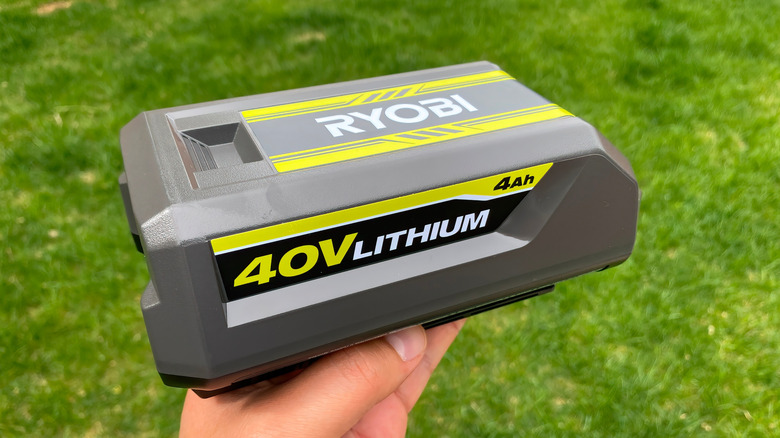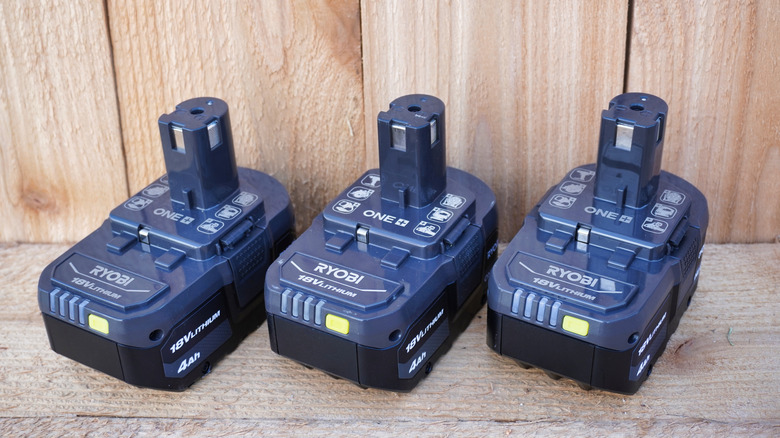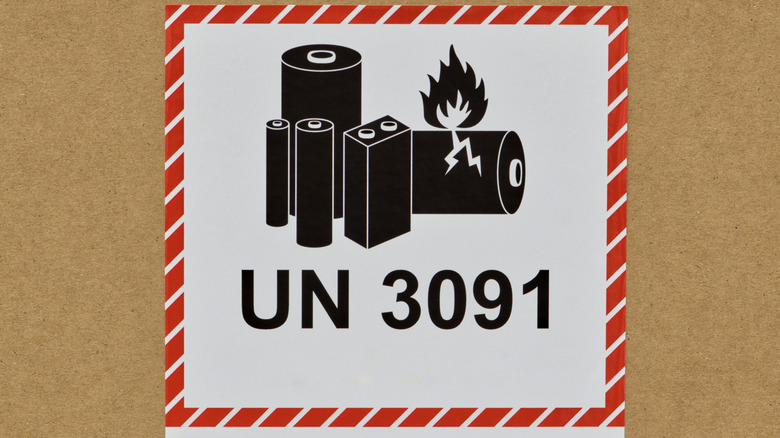After This 40V Ryobi Battery Exploded, Check That You're Storing Yours Right
We may receive a commission on purchases made from links.
Much like most of the other major power tool brands out there, Ryobi has gone all-in on battery power. The bulk of the line's appliances are powered by its various batteries, which range in size, longevity, and power, and it's not hard to see why. Battery-powered tools run just fine and aren't inhibited by cords, though that's not to say that they're perfect. Despite being the standard, lithium-ion batteries are burdened with some major problems.
Take, for instance, the case of Reddit user u/lexacost, who endured quite a scare courtesy of a Ryobi 40V battery. "I opened my garage door and freaked out. One of the 40V batteries exploding while i was sleeping," they explained in their post, noting that the smell of burning plastic alerted them that something was wrong, prompting them to investigate. They included a video where they walked through their garage, discovering a heavily melted Ryobi battery sitting in their tool box.
It should be emphasized that Ryobi's 40V batteries aren't defective across the board, such an incident is merely a good time to go over storage best practice for Ryobi and lithium-ion batteries in general, decreasing the likelihood of users falling prey to any such surprise in the future.
What proper battery storage looks like
While it may not prevent every kind of freak accident, storing lithium-ion batteries properly is necessary all the same. First and foremost, you should know that if your battery isn't going to be used for three days or more, it should be placed in a designated storage area, detached from any tools. It should only be put here at between 60% and 70% of its full storage capacity, as storing it at a full charge can be dangerous. Keeping it in a fireproof and explosion-proof battery safety bag is recommended as well, just in case things suddenly go haywire without your knowledge.
As far as the conditions of the storage area itself, it's important to be mindful of several aspects. The room itself needs to be cool – around 59 degrees Fahrenheit — and dry with ample ventilation. There shouldn't be any nearby heat sources, nor should there be any flammable materials such as carpet and dry wood present. Even with all of these precautions, it's wise to have a smoke detector set up close by, and a fire extinguisher at the ready. More specifically, a class ABC or CO2 fire extinguisher is needed due to the nature of the fire that can emanate from lithium-ion batteries.
Even when you follow best practice storage advice such as this, the unexpected can happen. If your battery should ever explode or ignite, it's essential to know what to do.
Handling leaking or exploding lithium-ion batteries
The Reddit user's Ryobi battery that went sour is a clear example of the dangers such batteries can pose. They can catch fire or even explode, and regardless of the reason why lithium-ion batteries catch fire, a response plan is necessary in case such incidents happen. As mentioned, a fire extinguisher should put it out, so long as it's a class ABC or CO2 fire extinguisher. Alternatively, a F-500 Encapsulator Agent extinguisher can get the job done effectively. It is of course essential to contact emergency services in the case of a battery explosion or fire.
As far as disposal is concerned, lithium-ion batteries in any condition shouldn't be tossed in a regular garbage can, a recycling bin, or otherwise left for the garbage company to take care of. Rather, they should be disposed of properly, being taken to a local hazardous material collection area. You can go online to find such points in your area, ensuring your worn out, potentially dangerous, or even already ruptured batteries are safely done away with. In the process, a ruptured lithium-ion battery should never be picked up or touched with bare hands.
Things can, without warning, get ugly with lithium-ion batteries. Random incidents are possible, so knowing how to store and dispose of batteries properly is essential for everyone's safety.


